小学语法讲解--四种时态综合练习
小升初英语四大时态复习讲解及真题专项练习含答案
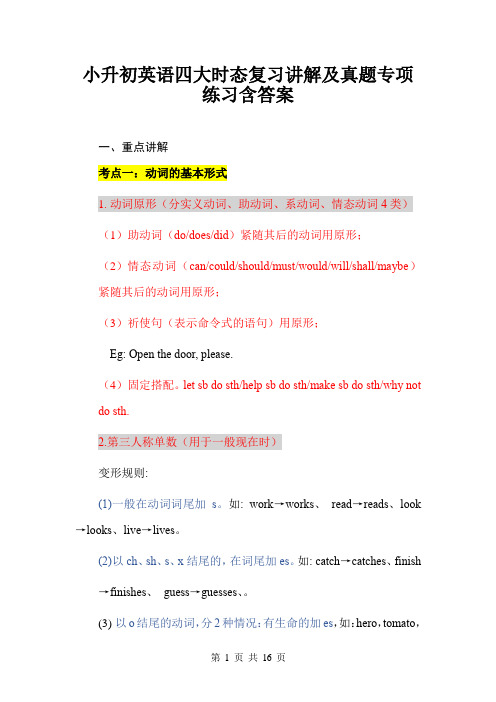
小升初英语四大时态复习讲解及真题专项练习含答案一、重点讲解考点一:动词的基本形式1.动词原形(分实义动词、助动词、系动词、情态动词4类)(1)助动词(do/does/did)紧随其后的动词用原形;(2)情态动词(can/could/should/must/would/will/shall/maybe)紧随其后的动词用原形;(3)祈使句(表示命令式的语句)用原形;Eg: Open the door, please.(4)固定搭配。
let sb do sth/help sb do sth/make sb do sth/why not do sth.2.第三人称单数(用于一般现在时)变形规则:(1)一般在动词词尾加s。
如: work→works、read→reads、look →looks、live→lives。
(2)以ch、sh、s、x结尾的,在词尾加es。
如: catch→catches、finish→finishes、guess→guesses、。
(3)以o结尾的动词,分2种情况:有生命的加es,如:hero,tomato,potato;没有生命的加s,如:radio,photo。
(4)以辅音字母加y结尾的动词,变y为ies。
如: fly→flies、study →studies、carry→carries.(5) 不规则变化。
如: have→has ,are→is,were→was3.现在分词(用于现在进行时)变形规则:(1)一般在动词后加ing。
如: work→working、read→reading、look →looking、wait→waiting。
(2)以不发音的e结尾的动词,去掉e,再加ing。
如: smile→smiling、move→moving、take→taking、write→writing。
(3)以重读闭音节结尾的且词尾只有一个辅音字母的,双写这个辅音字母加ing。
如: sit→sitting、stop→stopping、cut→cutting、run →running、swim→swimming.(4)少数几个以ie结尾的动词,将ie改为y加ing。
小学英语时态综合练习题
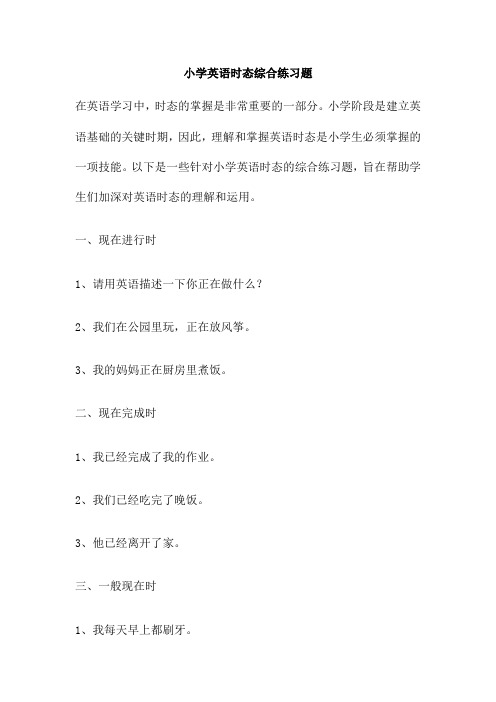
小学英语时态综合练习题在英语学习中,时态的掌握是非常重要的一部分。
小学阶段是建立英语基础的关键时期,因此,理解和掌握英语时态是小学生必须掌握的一项技能。
以下是一些针对小学英语时态的综合练习题,旨在帮助学生们加深对英语时态的理解和运用。
一、现在进行时1、请用英语描述一下你正在做什么?2、我们在公园里玩,正在放风筝。
3、我的妈妈正在厨房里煮饭。
二、现在完成时1、我已经完成了我的作业。
2、我们已经吃完了晚饭。
3、他已经离开了家。
三、一般现在时1、我每天早上都刷牙。
2、我们每周都去公园玩。
3、他每天晚上都读书。
四、一般过去时1、昨天我去了电影院。
2、上周我们去了海滩。
3、昨晚她看了电视。
五、一般将来时1、我明天将要完成作业。
2、我们下周将要去看电影。
3、他将在下个月搬到新家。
以上练习题旨在帮助学生理解和掌握基本的英语时态。
对于小学生来说,时态的学习可能相对复杂,但通过反复练习和实际应用,他们可以逐渐掌握并开始在日常生活中运用这些时态。
教师和家长可以鼓励学生多做类似的练习,帮助他们提高英语时态的理解和运用能力。
小学英语时态练习题一、一般现在时1、I eat apples every day. (我每天吃苹果。
)2、He studies hard every day. (他每天努力学习。
)3、They play basketball every week. (他们每周打篮球。
)二、现在进行时1、I am eating apples now. (我现在正在吃苹果。
)2、He is studying hard now. (他现在正在努力学习。
)3、They are playing basketball now. (他们现在正在打篮球。
)三、一般过去时1、I ate apples yesterday. (我昨天吃了苹果。
)2、He studied hard yesterday. (他昨天努力学习了。
)3、They played basketball yesterday. (他们昨天打篮球了。
(完整版)四种时态及其练习(完整版)
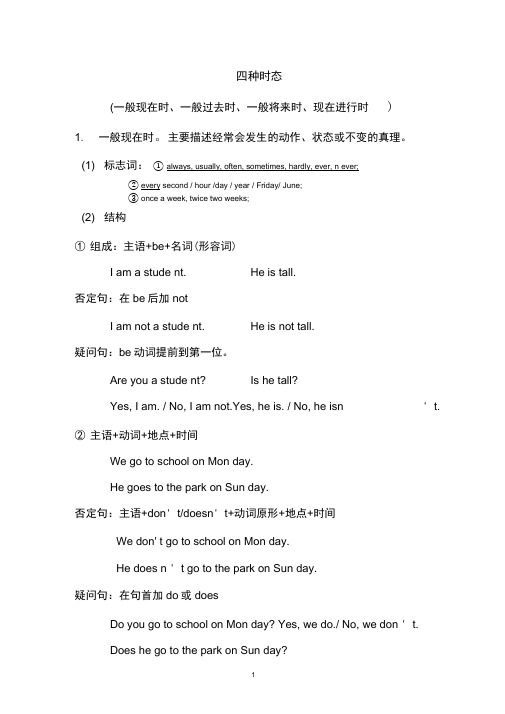
四种时态(一般现在时、一般过去时、一般将来时、现在进行时)1. 一般现在时。
主要描述经常会发生的动作、状态或不变的真理。
(1) 标志词:① always, usually, often, sometimes, hardly, ever, n ever;②every second / hour /day / year / Friday/ June;③once a week, twice two weeks;(2) 结构①组成:主语+be+名词(形容词)I am a stude nt. He is tall.否定句:在be后加notI am not a stude nt. He is not tall.疑问句:be动词提前到第一位。
Are you a stude nt? Is he tall?Yes, I am. / No, I am not.Yes, he is. / No, he isn ' t.②主语+动词+地点+时间We go to school on Mon day.He goes to the park on Sun day.否定句:主语+don' t/doesn' t+动词原形+地点+时间We don' t go to school on Mon day.He does n ' t go to the park on Sun day.疑问句:在句首加do或doesDo you go to school on Mon day? Yes, we do./ No, we don ' t.Does he go to the park on Sun day?Yes, he does./ No, he does n (3) 动词三单变化:① 在原单词末尾加s ,如:like - likes② 单词以 o, sh, ch, s, x 结尾力口 es,女口: go - goes ③ 单词末尾为辅音+y 结尾去y 加ies 女口: study- studies 2.现在进行时:主要叙述正在发生的事情。
小学四大时态知识点讲解以及四大时态综合训练题
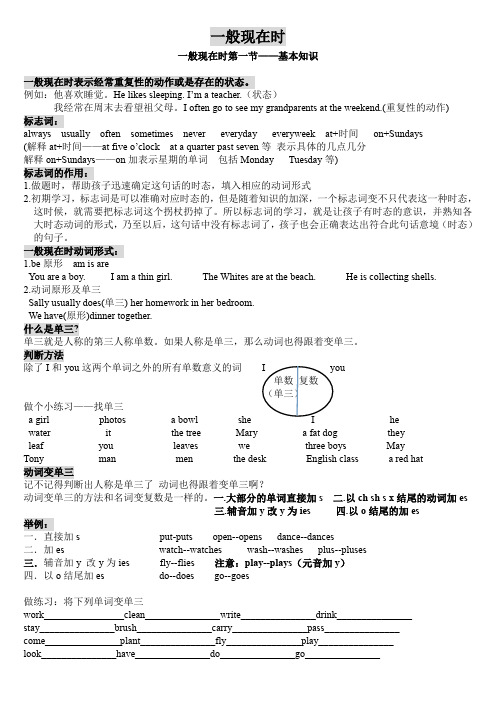
一般现在时一般现在时第一节——基本知识一般现在时表示经常重复性的动作或是存在的状态。
例如:他喜欢睡觉。
He likes sleeping. I’m a teacher.(状态)我经常在周末去看望祖父母。
I often go to see my grandparents at the weekend.(重复性的动作)标志词:always usually often sometimes never everyday everyweek at+时间on+Sundays(解释at+时间——at five o’clock at a quarter past seven等表示具体的几点几分解释on+Sundays——on加表示星期的单词包括Monday Tuesday等)标志词的作用:1.做题时,帮助孩子迅速确定这句话的时态,填入相应的动词形式2.初期学习,标志词是可以准确对应时态的,但是随着知识的加深,一个标志词变不只代表这一种时态,这时候,就需要把标志词这个拐杖扔掉了。
所以标志词的学习,就是让孩子有时态的意识,并熟知各大时态动词的形式,乃至以后,这句话中没有标志词了,孩子也会正确表达出符合此句话意境(时态)的句子。
一般现在时动词形式:1.be原形am is areYou are a boy. I am a thin girl. The Whites are at the beach. He is collecting shells.2.动词原形及单三Sally usually does(单三) her homework in her bedroom.We have(原形)dinner together.什么是单三?单三就是人称的第三人称单数。
如果人称是单三,那么动词也得跟着变单三。
判断方法除了I和you这两个单词之外的所有单数意义的词I you单数复数(单三)做个小练习——找单三a girl photos a bowl she I hewater it the tree Mary a fat dog theyleaf you leaves we three boys MayTony man men the desk English class a red hat动词变单三记不记得判断出人称是单三了动词也得跟着变单三啊?动词变单三的方法和名词变复数是一样的。
小学英语六年级所有时态综合练习
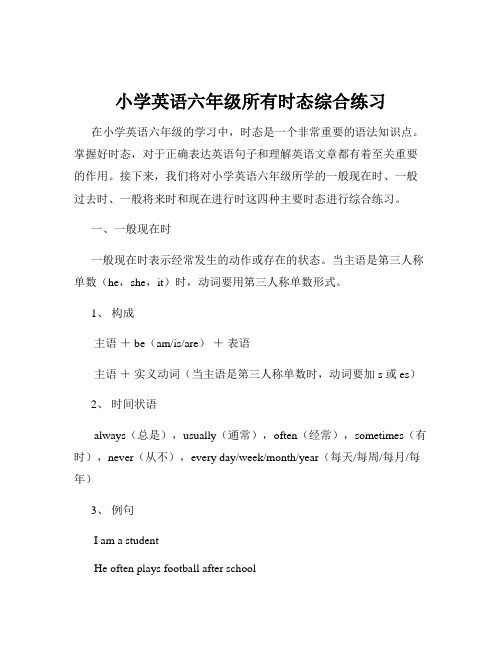
小学英语六年级所有时态综合练习在小学英语六年级的学习中,时态是一个非常重要的语法知识点。
掌握好时态,对于正确表达英语句子和理解英语文章都有着至关重要的作用。
接下来,我们将对小学英语六年级所学的一般现在时、一般过去时、一般将来时和现在进行时这四种主要时态进行综合练习。
一、一般现在时一般现在时表示经常发生的动作或存在的状态。
当主语是第三人称单数(he,she,it)时,动词要用第三人称单数形式。
1、构成主语+ be(am/is/are)+表语主语+实义动词(当主语是第三人称单数时,动词要加 s 或 es)2、时间状语always(总是),usually(通常),often(经常),sometimes(有时),never(从不),every day/week/month/year(每天/每周/每月/每年)3、例句I am a studentHe often plays football after schoolThey are very happy练习:1、 My father ______ (watch) TV every night2、 She ______ (like) music very much3、 The children often ______ (play) in the park二、一般过去时一般过去时表示过去发生的动作或存在的状态。
1、构成主语+ was/were +表语主语+动词的过去式2、时间状语yesterday(昨天),last week/month/year(上周/上个月/去年),ago(以前),in +过去的年份3、例句I was at home yesterdayThey played basketball last weekHe went to Beijing two years ago练习:1、 We ______ (have) a party last night2、 She ______ (buy) a new dress yesterday3、 He ______ (do) his homework an hour ago三、一般将来时一般将来时表示将来要发生的动作或存在的状态。
(完整版)小学四大时态的综合练习
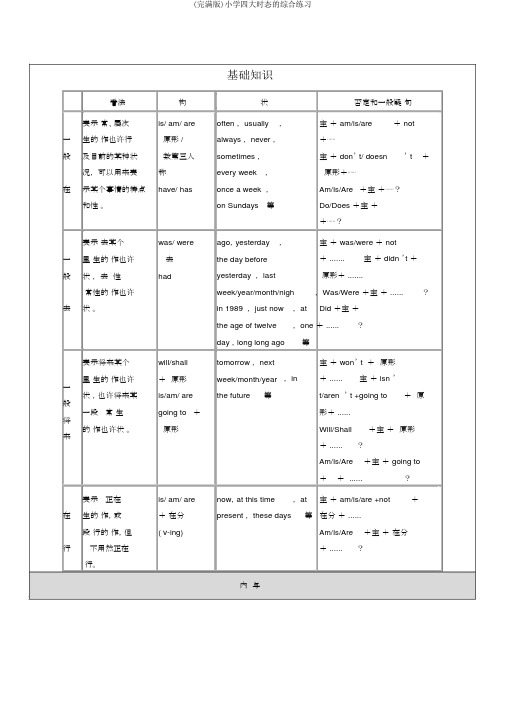
基础知识看法构状否定和一般疑句表示常、屡次is/ am/ are often , usually ,主+ am/is/are + not一生的作也许行原形 / always , never ,+⋯⋯般及目前的某种状数第三人sometimes ,主+ don’ t/ doesn ’ t +况,可以用来表称every week ,原形+⋯⋯在示某个事情的特点have/ has once a week ,Am/Is/Are +主+⋯⋯?和性。
on Sundays 等Do/Does +主++⋯⋯?表示去某个was/ were ago,yesterday ,主+ was/were + not一里生的作也许去the day before + ....... 主+ didn ’t +般状,去性had yesterday , last 原形+ .......常性的作也许week/year/month/nigh , Was/Were +主+ ...... ?去状。
in 1989 , just now , at Did +主+the age of twelve , one + ...... ?day ,long long ago 等表示将来某个will/shall tomorrow , next 主+ won’ t +原形里生的作也许+原形week/month/year , in + ...... 主+ isn ’一状,也许将来某is/am/ are the future 等t/aren ’ t +going to +原般一段常生going to +形+ ......将的作也许状。
原形Will/Shall +主+原形来+ ...... ?Am/Is/Are +主+ going to++ ...... ?表示正在is/ am/ are now,at this time , at 主+ am/is/are +not +在生的作,或+在分present , these days 等在分+ ......段行的作,但( v-ing) Am/Is/Are +主+在分行不用然正在+ ...... ?行。
小学四种时态试题及答案

小学四种时态试题及答案一、一般现在时1. 我每天上学。
A. go to schoolB. goes to schoolC. am going to schoolD. am going to go to school答案:A2. 他经常帮助别人。
A. He often help others.B. He often helps others.C. He often helped others.D. He often helping others.答案:B3. 我们喜欢游泳。
A. We like to swim.B. We likes to swim.C. We liked to swim.D. We liking to swim.答案:A二、一般过去时4. 昨天我去了图书馆。
A. I go to the library yesterday.B. I went to the library yesterday.C. I am going to the library yesterday.D. I go to the library yesterday.答案:B5. 他们上周看了电影。
A. They watch a movie last week.B. They watched a movie last week.C. They are watching a movie last week.D. They will watch a movie last week.答案:B6. 她昨天买了一本书。
A. She buy a book yesterday.B. She bought a book yesterday.C. She is buying a book yesterday.D. She will buy a book yesterday.答案:B三、一般将来时7. 明天我要去看医生。
A. I am going to see a doctor tomorrow.B. I go to see a doctor tomorrow.C. I went to see a doctor tomorrow.D. I will go to see a doctor tomorrow.答案:A8. 他们将要参加比赛。
小学英语四种时态知识点加练习题.docx
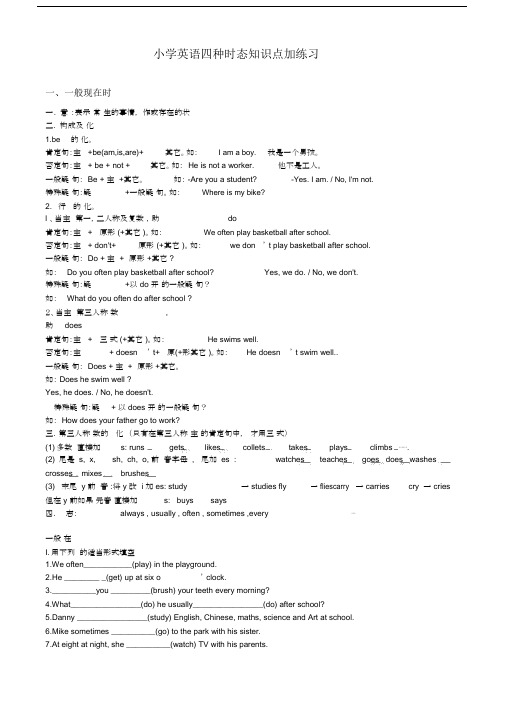
如:Does he swim well ?
Yes, he does. / No, he doesn't.
特殊疑 句:疑+以does开 的一般疑 句?
如:How does your father go to work?
三.第三人称 数的 化 (只有在第三人称 主 的肯定句中, 才用三 式)
动作。结构:助动词be ( am / is / are ) +现在分词.
二、现在分词的构成:
1.大多数动词后可在动词后直接加-ing.
Eg: carry-carrying,catch-catching,drink-drinking, enjoy-enjoying hurry-hurrying,do-doing ,
小学英语四种时态知识点加练习
一、一般现在时
一.意 :表示 常 生的事情, 作或存在的状
二.构成及 化
1.be
的 化。
肯定句:主+be(am,is,are)+其它。如:I am a boy.
否定句:主+ be + not +其它。如:He is not a worker.
一般疑 句:Be +主+其它。如:-Are you a student?
否定句:主+ don't+原形(+其它)。如:we don’t play basketball after school.
一般疑 句:Do +主+原形+其它?
如:Do you often play basketball after school?Yes, we do. / No, we don't.
小学英语四种时态的综合讲解及练习

一般将来时:定义:一般将来时表示将来某一时刻的动作或状态,或将来某一段时间内经常的动作或状态。
构成:(1)be going to + 动词原形(2)will/shall + do用法:1)表示将来的动作或状态一般将来时常与一些表示将来的时间状语连用,如:tomorrow(明天),next week(下周),from nowon(从现在开始);in the future(将来);someday (未来的某一天) 等。
2)表示将来经常发生的动作I’ll teach you English every Wednesday next month.★★★“be going to+动词原形”表示即将发生的或最近打算进行的事。
例如:①It is going to rain. 要下雨了。
②We are going to have a meeting today. 今天我们开会。
Step Three: Do Some Exercise一、用will 或will not 以及括号中的动词完成句子1、I a Chinese song.(sing)2、Sally the tennis match.(not win)3、You the one-day trip to Guangzhou.(enjoy)4、Flora at home this weekend.(not stay)二、用括号内的词和be going to 完成问答1、(when/we/ have dinner? We / it / at seven o’clock)A When are we going to have dinner?B We are going to have it at seven o’clock.2、(Where / you /meet your friends? We / them /at the school gate)AB3、(you and Ling / play football/ today? No / we/ table tennis)AB现在进行时be+动词ing。
小学英语六年级总复习四种十时态的结构和标志词语法讲解及基础练习
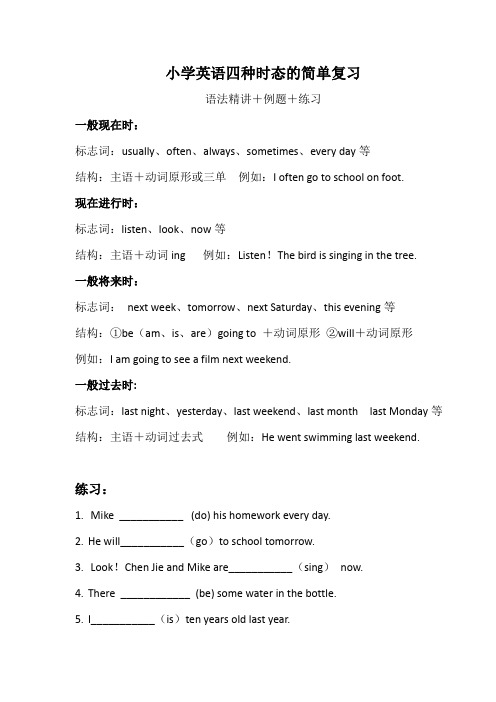
小学英语四种时态的简单复习语法精讲+例题+练习一般现在时:标志词:usually、often、always、sometimes、every day等结构:主语+动词原形或三单例如:I often go to school on foot.现在进行时:标志词:listen、look、now等结构:主语+动词ing 例如:Listen!The bird is singing in the tree.一般将来时:标志词:next week、tomorrow、next Saturday、this evening等结构:①be(am、is、are)going to +动词原形②will+动词原形例如:I am going to see a film next weekend.一般过去时:标志词:last night、yesterday、last weekend、last month last Monday等结构:主语+动词过去式例如:He went swimming last weekend.练习:1. Mike ___________ (do) his homework every day.2.He will___________(go)to school tomorrow.3. Look!Chen Jie and Mike are___________(sing)now.4.There ____________ (be) some water in the bottle.5.I___________(is)ten years old last year.6. We like ____________ (play) basketball after class.7.He___________(ride)a bike with his friend next week.8.My brother is___________(make)kites.9.They___________(do)their homework yesterday.10.We___________(take)a trip over the summer holiday.11. I like singing. I often ____________ (listen) to the music in the evening.12. My grandma ___________ (watch) TV every day.13.Mike didn’t___________(see)a film last night.14.What______you ______ ______ ______ (do)next Saturday.15.Is he___________(watch)TV ?Yes,they are.。
小学四大时态讲解及训练
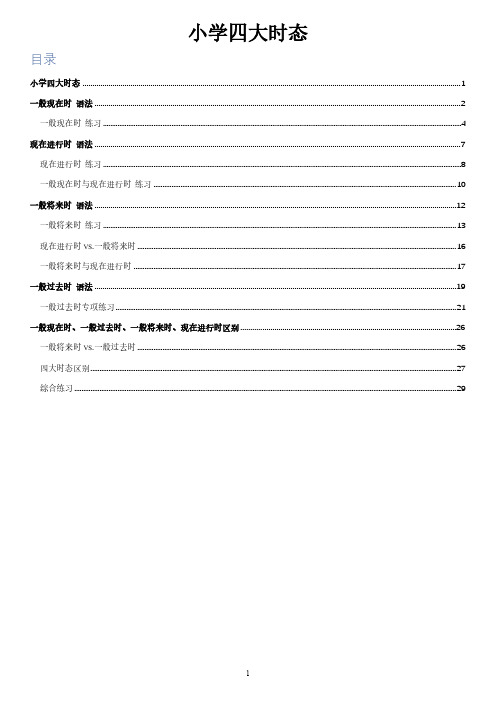
小学四大时态目录小学四大时态 (1)一般现在时语法 (2)一般现在时练习 (4)现在进行时语法 (7)现在进行时练习 (8)一般现在时与现在进行时练习 (10)一般将来时语法 (12)一般将来时练习 (13)现在进行时VS.一般将来时 (16)一般将来时与现在进行时 (17)一般过去时语法 (19)一般过去时专项练习 (21)一般现在时、一般过去时、一般将来时、现在进行时区别 (26)一般将来时VS.一般过去时 (26)四大时态区别 (27)综合练习 (29)一般现在时语法I. 一般现在时的定义:表示通常性、规律性、习惯性的状态或者动作(有时间规律发生的事件)的一种时间状态。
II. 请看下列例子:I am a student.He gets up at 7:00 every day.They are my parents.Lucy likes singing.主语可以是人或物,也可以是人称代词be动词要根据主语变化,要跟主语一致/ 行为动词也要根据主语的变化:当主语是三单时,动词要加s/es;当主语是非三单时,动词用原形。
其他III. 一般现在时的句型结构及举例:1. be动词的变化句式句型结构及例子肯定式主语+be动词(am/ is/ are) +其他I am a girl.否定式主语+be动词(am/ is/ are) +not+其他He is not a student. 【is not=isn’t are not=aren’t】一般疑问句式Be动词+主语+其他? Are you a worker?特殊疑问句式特殊疑问词+一般疑问句? Where is my pencil?肯定句变一般疑问句:一提、二改、三问号。
1. 一提:提be动词在句首2. 二改:改首字母大小写,改人称:第一人称I/we变第二人称you,第二人称you变第一人称I/we,be动词保持主语一致3. 三问号:句点变问号2. 行为动词的变化句式句型结构及例子肯定句主语+行为动词+其他We study English every day.否定句主语+助动词(don’t/doesn’t)+动词原形+其他I don’t like pork.He doesn’t like often play football.一般疑问句助动词(do/does)+主语+动词原形+其他? Do you often play football?Does she go to work by bike?特殊疑问句疑问词+一般疑问句?How do you go to school?How does your mother go to work?IV. 动词变成现在分词形式的规则:构成规则例词一般情况下,直接+s cook-cooks, live-lives, like-likes, read-reads 以s, x, sh, ch, o结尾的动词,词尾+es watch-watches, do-does, wash-washes, go-goes 以“辅音字母+y”结尾的动词,变y为i+es study-studiesV. 常用的时间词语和短语:every day, always, often, usually, sometimes, at the weekends, on Sundays等…一般现在时练习一.写出下列动词的第三人称单数:drink ______________ go _____________ stay ______________ make _____________ look _____________ have______________ pass_____________ carry _______________ come_____________ watch_____________ plant____________ fly _______________ study_____________ brush______________ do______________ teach______________二.用括号内动词的适当形式填空:1. He often _____________(have) dinner at home.2. Daniel and Tommy ____________(be) in Class One.3. We _______________(not watch) TV on Monday.4. Nick ________________(not go) to the zoo on Sunday.5. ___________ they _____________(like) the World Cup?6. What ____________they often ____________(do) on Saturdays?7. ____________ your parents ____________(read) newspapers every day?8. The girl ____________(teach) us English on Sundays.9. She and I _____________(take) a walk together every evening.10. There _____________(be) some water in the bottle.11. Mike ____________(like) cooking.12. They ____________(have) the same hobby.13. My aunt ____________(look) after her baby carefully.14. I ____________(be) ill. I’m staying in bed.15. She ____________(go) to school from Monday to Friday.16. -What day ____________(be) it today? -It’s Saturday三.单项选择:1. I __________the piano on Sundays.A. playB. am playC. playingD. plays2. ________ your mother _______lunch at home?A. Do, haveB. Does, haveC. Does, hasD. Do, has3. My father_________ in Beijing but I _________in Hangzhou.A. live, livesB. lives, liveC. live, liveD. lives, lives4. We _______ have lunch at 12:00 every day.A. doesn’tB. aren’tC. don’tD. didn’t5. He doesn’t _______ that.A. doesB. doC. didD. /6. _______ you listen to English in the morning?A. DoB. AreC. DoesD. Am7. —Does Jim have a pear?—Yes, he ______.A. IsB. haveC. doD. does8. I don’t_________ breakfast, but my sister_________.A. has, hasB. have, doesn’tC. has, haveD. have, does9. —What _______she do?—She is a teacher. She _________ French.A. is, teachB. does, teachC. does, teachesD. do, teaches10. She ________ fishing with her sister every Sunday.A. is goingB. shall goC. goD. goes四.按照要求改写句子:1. Daniel watches TV every evening. (改为否定句)___________________________________________________2. I do my homework every day. (改为一般疑问句,作否定回答)_____________________________________________________3. She likes milk. (改为一般疑问句,作肯定回答)___________________________________________________4. Amy likes playing computer games. (改为一般疑问句,作肯定回答)___________________________________________________5. We go to school every morning. (改为否定句)_____________________________________________________6. He speaks English very well. (改为否定句)___________________________________________________7. I like taking photos in the park. (对划线部分提问)____________________________________________________ 8. John comes from Canada. (对划线部分提问)___________________________________________________ 9. She is always a good student. (改为一般疑问句,作否定回答)____________________________________________________ 10. Simon and Daniel like going skating. (改为否定句)___________________________________________________五.改错(划出错误的地方,将正确的写在横线上)1. Is your brother speak English? __________________2. Does he likes going fishing? __________________3. He likes play games after class. __________________4. Mr. Wu teachs us English. __________________5. She don’t do her homework on Sundays. _________________现在进行时语法I. 现在进行时的定义:现在进行时一般表示正在进行的动作或事情,也可表示当前一段时间内的活动或现阶段正在进行的动作。
小学六年级英语四种时态综合练习
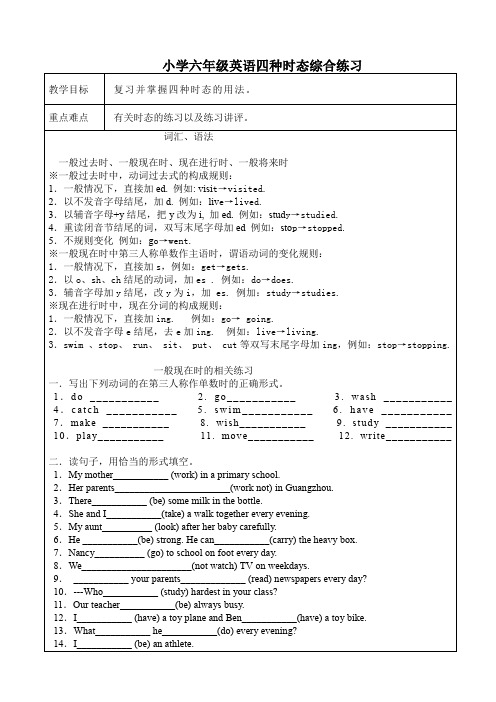
6.Look! The boy ______________________(swim ) with his friends in the pool. 7.She______________________(write) a letter now. 8.The reading room is quiet. Everybody ______________________( read ) books
market. 22.Ben___________ (like) cooking. 23.I always_______________ (finish) my homework before 8:00. 24.They___________ (have) a big house. 25.My father is a teacher. He___________(teach) English in a middle school. 26.Lucy_________ (do) not like English. 27.Who___________(cook) breakfast for you everyday? 三.按要求转换句子,每空一词。 1.Tom likes playing chess with his friends. (改成否定句)
homework. 三.按要求改写句子。
1.They are having an English class.(改为一般疑问句)
_________________________________________________________________ 2.My mother is cooking.(变成一般疑问句并且作肯定回答)
教学目标
小学六年级英语四种时态综合练习
小学四种时态讲解及专项练习
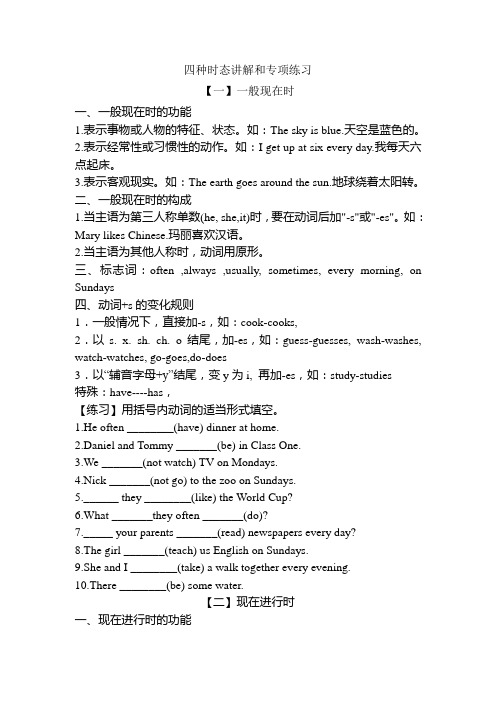
四种时态讲解和专项练习【一】一般现在时一、一般现在时的功能1.表示事物或人物的特征、状态。
如:The sky is blue.天空是蓝色的。
2.表示经常性或习惯性的动作。
如:I get up at six every day.我每天六点起床。
3.表示客观现实。
如:The earth goes around the sun.地球绕着太阳转。
二、一般现在时的构成1.当主语为第三人称单数(he, she,it)时,要在动词后加"-s"或"-es"。
如:Mary likes Chinese.玛丽喜欢汉语。
2.当主语为其他人称时,动词用原形。
三、标志词:often ,always ,usually, sometimes, every morning, on Sundays四、动词+s的变化规则1.一般情况下,直接加-s,如:cook-cooks,2.以s. x. sh. ch. o结尾,加-es,如:guess-guesses, wash-washes, watch-watches, go-goes,do-does3.以“辅音字母+y”结尾,变y为i, 再加-es,如:study-studies特殊:have----has,【练习】用括号内动词的适当形式填空。
1.He often ________(have) dinner at home.2.Daniel and Tommy _______(be) in Class One.3.We _______(not watch) TV on Mondays.4.Nick _______(not go) to the zoo on Sundays.5.______ they ________(like) the World Cup?6.What _______they often _______(do)?7._____ your parents _______(read) newspapers every day?8.The girl _______(teach) us English on Sundays.9.She and I ________(take) a walk together every evening.10.There ________(be) some water.【二】现在进行时一、现在进行时的功能现在进行时表示现在正在进行或发生的动作,也可表示当前一段时间内的活动或现阶段正在进行的动作。
小学英语语法四个基本时态综合练习题
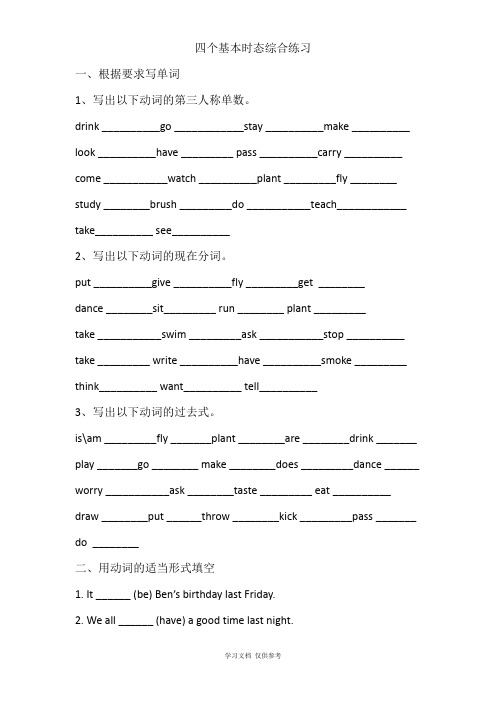
四个基本时态综合练习一、根据要求写单词1、写出以下动词的第三人称单数。
drink __________go ____________stay __________make __________ look __________have _________ pass __________carry __________ come ___________watch __________plant _________fly ________ study ________brush _________do ___________teach____________ take__________ see__________2、写出以下动词的现在分词。
put __________give __________fly _________get ________dance ________sit_________ run ________ plant _________take ___________swim _________ask ___________stop __________ take _________ write __________have __________smoke _________ think__________ want__________ tell__________3、写出以下动词的过去式。
is\am _________fly _______plant ________are ________drink _______ play _______go ________ make ________does _________dance ______ worry ___________ask ________taste _________ eat __________ draw ________put ______throw ________kick _________pass _______ do ________二、用动词的适当形式填空1. It ______ (be) Ben’s birthday last Friday.2. We all ______ (have) a good time last night.3. He ________ (jump) high on last Sports Day.4. Helen ________ (milk) a cow on Friday.5. She likes ______ newspapers, but she ______a book yesterday. (read)6. He _______football now, but they _______ basketball just now. (play)7. Jim’s mother _________ (plant) trees just now.8. _______ they ________ (sweep) the floor on Sunday? No, they _____9. I _______ (watch) a cartoon on Monday.10. We ___________ (go) to school on Sunday.11. It _____ (be) the 2nd of November yesterday. Mr White ________ (go) to his office by car.12. Gao Shan ________ (put) the book on his head a moment ago.13. Don’t ______ the house. Mum _______ it yesterday. (clean)14. What ____ you ______ just now? I _______ some housework. (do)15. They _________ (make) a kite a week ago.16. I want to ______ (pick)apples.But my dad _______ (pick)all of them last month.17. _______ he ______ (water)the flowers this morning? Yes, he _____.18. She ____ (be) a pretty girl. Look, she _____ (do) Chinese dances.19. The students often _________ (draw) some pictures in the art room.20.What ______ Mike do on the farm? He ________ cows. (milk)21.I ______to school from Monday to Friday. My brother often _______to school with me. Yesterday we _______to school together. We like _____ ___to school very much. ( go )22.They usually _______lunch at home. But last week, they ____lunch at school. ( have )23.That______my English book. It _____new. But now it _____not here. It ______there a moment ago. ( be )24.My sister likes ________very much. She often _______at our school festival. Last term, she _______a lot of songs in the school hall. She _____ beautifully. ( sing )25.What _____ he usually ______on Sunday? He usually ______his home work. Look! He __________his homework now. ______he _______his ho mework last Sunday? Yes, he_______. ( do )26.Do people usually_______ moon cakes at Mid-autumn Festival? Yes, they do. Did you _______moon cakes last Mid-autumn Festival?Yes, I did. I _______a lot of delicious moon cakes. ( eat )三、按要求完成句子1〕I’m going to get up at 6:30 tomorrow.〔改一般疑问句〕2) I watched TV last night.〔改为一般疑问句,并作否认答复〕3) Their teacher told them a story yesterday.〔对划线部分提问〕4) She usually watches TV. 〔对划线部分提问〕5)Amy is swimming in the sea.(改为否认句)。
专题10 动词四大时态-小学语法精讲精练(附口诀、练习和答案)

小学语法精讲精练专题10 时态思考引入同学们,想跟老师一起来一趟时空之旅吗?想!我们真的可以穿越时空吗?当然不是真的穿越时空啦!老师说的是我们这节课要学的动词时态吧。
哈哈!是的,我说的"时空之旅"就是跟随动词形式变化进行的时态之旅。
我们可以通过动词的不同形式来体现不同时间发生的动作或存在的状态,可以从中体验过去、现在、未来发生的各种趣事!知识概览一、一般现在时一般现在时表示习惯性、永久性的或反复发生的动作或现在存在的状态。
1.一般现在时的结构 (1)肯定结构①主语+ am/is/are +表语知识精讲I am Chinese.我是中国人。
②主语+谓语动词原形/第三人称单数形式(+其他)I like swimming.我喜欢游泳。
③主语+情态动词+谓语动词原形(+其他)I can finish my work today.我今天可以完成我的工作。
(2)否定结构①主语+ am not/isn't/aren't +表语She isn't a nurse.她不是护士。
②主语+ don't/doesn't+谓语动词原形(+其他)I don't like bananas.我不喜欢香蕉。
③主语+情态动词的否定式+谓语动词原形(+其他)We shouldn't run the red light.我们不应该闯红灯。
(3)一般疑问句结构①Is/Are +主语+表语Are you a doctor?你是医生吗?②Do/Does +主语+谓语动词原形(+其他)Do you want to play basketball?你想打篮球吗?③情态动词+主语+谓语动词原形(+其他)Can you jump far,Sam?山姆,你能跳得很远吗?(4)特殊疑问句结构:特殊疑问词+一般疑问句句式What can you do?你会做什么?Who is your father?你的父亲是谁?When does he usually go to school?他通常什么时候上学?2.一般现在时的用法(1)表示经常性或习惯性的动作或存在的状态I take a walk after dinner every day.我每天晚饭后散步。
小学英语语法讲解-四类基本时态练习
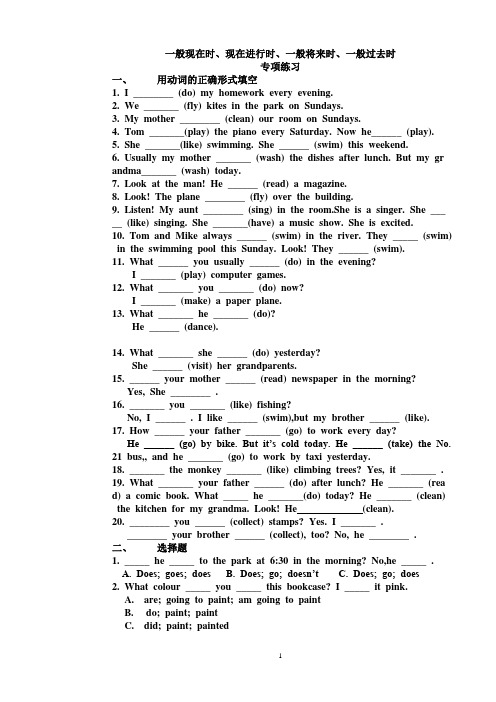
一般现在时、现在进行时、一般将来时、一般过去时专项练习一、用动词的正确形式填空1. I ________ (do) my homework every evening.2. We _______ (fly) kites in the park on Sundays.3. My mother ________ (clean) our room on Sundays.4. Tom _______(play) the piano every Saturday. Now he______ (play).5. She _______(like) swimming. She ______ (swim) this weekend.6. Usually my mother _______ (wash) the dishes after lunch. But my gr andma_______ (wash) today.7. Look at the man! He ______ (read) a magazine.8. Look! The plane ________ (fly) over the building.9. Listen! My aunt ________ (sing) in the room.She is a singer. She ___ __ (like) singing. She _______(have) a music show. She is excited.10. Tom and Mike always ______ (swim) in the river. They _____ (swim) in the swimming pool this Sunday. Look! They ______ (swim).11. What ______ you usually ______ (do) in the evening?I _______ (play) computer games.12. What _______ you _______ (do) now?I _______ (make) a paper plane.13. What _______ he _______ (do)?He ______ (dance).14. What _______ she ______ (do) yesterday?She ______ (visit) her grandparents.15. ______ your mother ______ (read) newspaper in the morning?Yes, She ________ .16. _______ you _______ (like) fishing?No, I ______ . I like ______ (swim),but my brother ______ (like). 17. How ______ your father _______ (go) to work every day?He ______ (go) by bike. But it’s cold today. He ______ (take) the No.21 bus,, and he _______ (go) to work by taxi yesterday.18. _______ the monkey _______ (like) climbing trees? Yes, it _______ .19. What _______ your father ______ (do) after lunch? He _______ (read) a comic book. What _____ he _______(do) today? He _______ (clean) the kitchen for my grandma. Look! He (clean).20. ________ you ______ (collect) stamps? Yes. I _______ .________ your brother ______ (collect), too? No, he ________ .二、选择题1. _____ he _____ to the park at 6:30 in the morning? No,he _____ .A. Does; goes; doesB. Does; go; doesn’tC. Does; go; does2. What colour _____ you _____ this bookcase? I _____ it pink.A. are; going to paint; am going to paintB. do; paint; paintC. did; paint; painted3. Tim always _____ a picture at home. He _____ a car now.A. draws; is drawingB. draw; drawC. draws; draw4. She usually _____ her friends. They often _____ tea.A. see; drinkB. sees; drinksC. sees; drink5. He usually _____ the dishes at night, but tonight he _____ clothes.A. wash; washB.washes; is going to washC. is washing; washes6. Mr. Green usually _____ his newspaper in the evening, but he and hi s wife _____ television yesterday evening.A.reads; watchesB.reads; is going to watchC.reads; watched7. Where are the man and the woman? They _____ near the tree.A. sitB. satC. are sitting8. _____ your penpal _____ diving? No, he _____ .He ______ writing sto ries.A. Does; like; doesn’t; likesB. Does; likes; doesn’t; likeC. Do; like; don’t; likes9. _____ you _____ fishing yesterday? No, we _____ .A. Doe s; go; doesn’tB. Did; go; didn’tC. Do; go; don’t10. Open the window, Please. Look! He _____ it.A. opensB. is openningC. is opening11. I usually _____ some milk every day. But I _____ coffee yesterday.A. drink; drankB. is drinking; drinkC. drank; am drinking12. Mr. Green often _____ his newspapers at night. But he _____ an interesting book tonight.A. reads; readsB. reads; readC. reads; is going to read13. The old man _____ playing sports in the park. He _____ morning exercise now.A. likes; is doingB. likes; doesC. like; doing14. What _____ you usually _____ in the evening? I ______ computer games.What _____ you _____ last night? I _____ a book.A. do; do; playB. did; do; playedC. does; do; playsdid; do; read do; do; read do; do; am reading15. Where ______ the boy _____ ? He _____ across the river now.A. does; swim; swimsB. is; swimming; is swimmingD. is; swimming; is swimming16. _____ you _____ to music now? Yes, we _____ .A. Do; listen; doB. Did; listen; didC. Are; listening; are17. Put on you coat, please. OK. I ______ it on.A. am puttingB. am going to putC. put18. _____ you ______ coffee? Yes, I ______ .A. Do; like; doB. Did; like; didC. Are; like; am19. Look! Two cats ______ across the wall.A. runB. runsC. are running20. She _____ tea, but he _____ .A. likes; doesn’t B; like; don’t C. like; doesn’t。
小学英语四种常考时态语法题
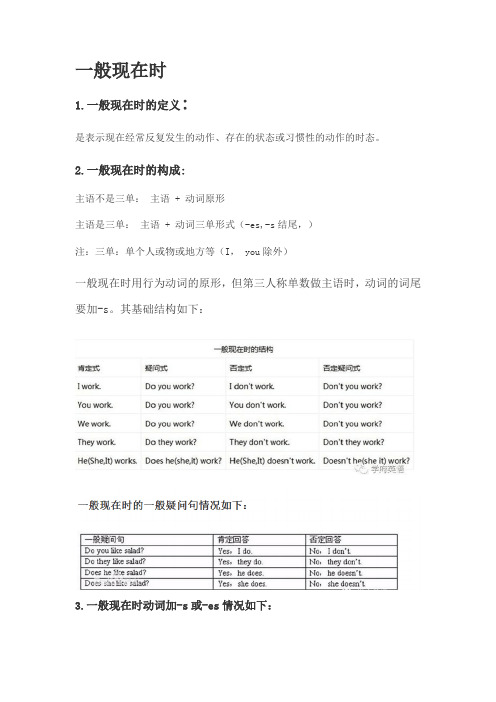
一般现在时1.一般现在时的定义:是表示现在经常反复发生的动作、存在的状态或习惯性的动作的时态。
2.一般现在时的构成:主语不是三单:主语 + 动词原形主语是三单:主语 + 动词三单形式(-es,-s结尾,)注:三单:单个人或物或地方等(I, you除外)一般现在时用行为动词的原形,但第三人称单数做主语时,动词的词尾要加-s。
其基础结构如下:3.一般现在时动词加-s或-es情况如下:当主语是第三人称单数时,谓语动词需加-s或-es①一般在词尾加-s,例如:play—plays work—works leave--leaves swim--swimshelp--helps like--likes②以字母s,x,ch,sh,o结尾的词加-es,例如:pass--passes fix—fixes teach--teaches wish--wishesdo--does go--goes③以辅音字母加y结尾的词,先变y为i,再加-es,例如:study--studies carry—carries fly--flies cry--cries④不规则变化,例如:have--has be--am,is,are4.一般现在时的用法1.表示经常性的或习惯性的动作。
常与often, always, sometimes, every day, on Mondays/Sundays等表示频度的时间状语连用。
I get up at six o'clock every day.我每天6点起床。
He often goes to school by bike.他经常骑自行车上学。
2.表示主语具备的性格、能力和特征。
He knows not only Chinese, but also English.他不仅懂中文,还懂英语。
I like singing.我喜欢唱歌。
5.我来练一练一.写出下列动词的第三人称单数形式。
1. work _____read_____clean_____write_____2. teach_____wash_____guess_____watch_____3. do_____have_____are_____give_____4. study_____fly_____cry_____catch_____5. meet_____think_____win_____play_____二、根据句子,选词填空。
完整版)小学四大时态的综合练习

完整版)小学四大时态的综合练习基础知识概念结构、时间状语、否定和一般疑问句在英语语法中,有一些基础知识是必须掌握的,包括概念结构、时间状语、否定和一般疑问句等。
其中,概念结构是指一个句子中的各个成分之间的关系;时间状语则是表示时间的词语,如ago、yesterday、the day before yesterday、last week 等;否定形式包括主语+am/is/are+not以及主语+don't/doesn't+动词原形等;一般疑问句则是以am/is/are或do/does开头的问句,如Am/Is/Are+主语+。
或Do/Does+主语+。
表示过去某个时间在表示过去某个时间的时候,我们可以使用was/were来表示过去发生的动作或者状态,也可以使用had来表示过去的惯性动作或状态。
例如,我们可以说yesterday I was very busy,表示昨天我非常忙碌;又如,when I was young。
I had a lot of friends,表示在我年轻的时候,我有很多朋友。
表示经常、反复发生的动作或行为如果我们想要表达经常、反复发生的动作或行为,可以使用is/am/are+动词原形/动词的第三人称单数形式,或者使用often、usually、always、never、sometimes、every week、oncea week、on Sundays等时间状语。
例如,I usually go to bed at11 o'clock,表示我通常在11点钟睡觉;又如,she is always late for class,表示她上课总是迟到。
表示现况和性质在表示现况和性质的时候,我们可以使用have/has+动词原形+一段时间(如week/year/month/night)、in 1989、just now、at the age of twelve、one day、long long ago等时间状语。
- 1、下载文档前请自行甄别文档内容的完整性,平台不提供额外的编辑、内容补充、找答案等附加服务。
- 2、"仅部分预览"的文档,不可在线预览部分如存在完整性等问题,可反馈申请退款(可完整预览的文档不适用该条件!)。
- 3、如文档侵犯您的权益,请联系客服反馈,我们会尽快为您处理(人工客服工作时间:9:00-18:30)。
时态综合复习讲解方法:1.先标出时态标志性的词语,并判断出是哪种时态。
2.再判断句式(肯定句,否定句,一般疑问句,特殊疑问句)。
3.最后根据所属时态和所属时态的句式进行做题目。
用动词的适当形式填空。
1.Rose usually _________her homework after dinner. (do)2.They will not __________ football tomorrow. (play)3.Look .They ___________trees on the hills. (plant)4.Yesterday we ___________ a film on tv . (see )5.I hope the tree ___________well angain. (can grow)6.He __________ a worker ten years ago . (be)时态练习1 I (go) to school by bus everyday.2 He (go) for a walk on Sundays.3 Su Yang (go) to a farm with her parents last weekend.4 Let’s (go) and (see).5 What are you (go) to do tomorrow? I’m (go) to (have)a picnic.6 You (have) a stove and she (have) a tin-opener.7 What time do you (have) breakfast? I (have) breakfast at a quarter past seven.8 What do you (have)? They (have) a blanket.9 What are you doing? I’m (have) an English lesson.10 I (have) a good time yesterday.11 What are you going to do tomorrow? I’m going to (have) a picnic. 12What do you (like)? I (like) (duck).13What does she (like)? She (like) (take) photos.14 Does he like (plant) flowers?15 I (watch) TV at home last Sunday.16 My father (read) a newspaper now.17 It (be) the National Day holiday last week.18 I usually (do) my homework at seven o’clock.时态综合练习2 句式变换一、把一般现在时改为现在进行时。
(现在进行时:be+Ving)1)I go to the park._____________________________________________________________________2)They listen to the radio._____________________________________________________________________3)She does her homework._____________________________________________________________________二、把一般现在时改为一般将来时。
(将来时:be going to/will+V原)1)I go to the park._____________________________________________________________________2)They watch TV every day._____________________________________________________________________3)Jenny sings a song ._____________________________________________________________________三、把现在进行时改为一般现在时和一般将来时。
1)I am laughing loudly._____________________________________________________________________ _____________________________________________________________________2)They are waiting for a friend._____________________________________________________________________ _____________________________________________________________________3)Tony is looking for a toy ._____________________________________________________________________ _____________________________________________________________________4)She is eating hot dogs ._____________________________________________________________________ _____________________________________________________________________四、把一般将来时改为一般现在时和现在进行时1)I will stay in the hotel._____________________________________________________________________ _____________________________________________________________________2)I am going to play basketball._____________________________________________________________________ _____________________________________________________________________3)I am going to do some reading._____________________________________________________________________ _____________________________________________________________________六、按要求改写成相对应的时态。
1)I buy a can of cola.①____________________________________________(一般过去时)②____________________________________________(现在进行时)③____________________________________________(一般将来时)④____________________________________________(过去进行时)2)She washed face yesterday.①____________________________________________(一般现在时)②____________________________________________(现在进行时)③____________________________________________(一般将来时)④____________________________________________(过去进行时)3)They are visiting their relatives.①____________________________________________(一般现在时)②____________________________________________(现在过去时)③____________________________________________(一般将来时)④____________________________________________(过去进行时)4)Tom and Ben are going to go to Beijing.①____________________________________________(一般现在时)②____________________________________________(一般过去时)③____________________________________________(现在进行时)④____________________________________________(过去进行时)一、用恰当的be动词填空。
1.There a lot of sweets in the box.2.There some milk in the glass.3.There some people under the big tree.4.There a picture and a map on the wall.5.There a box of rubbers near the books.6.There lots of flowers in our garden last year.7.There a plate of chicken behind the fridge yesterday.8.There four cups of coffee on the table.二、用 have或has填空。
